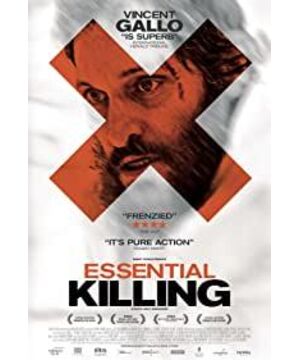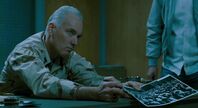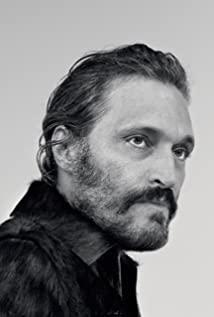As a spectator, I or you must ask yourself - is it enough to understand the spiritual world of an Arab man? And this "enough" is actually the right distance between me and "Necessary Killing", otherwise I will not appreciate this movie, even if I have seen it, I still miss it.
The story of "Killing Necessary" is extremely simple, about an Afghan "terrorist" from being captured to fleeing and then at the end of the road waiting to die. Throughout, the man has not said a word, and the only clues about him are a few shattered and messy flashbacks: the woman and the baby in the dainty blue burqa are his worldly love; the rest is his religious love, but more What's more is that he accepts the teachings about jihad with trepidation (and in my opinion it is almost abetment, of course, my judgment is also related to ideology).
**There must be a word first. The following comments are troublesome and long-winded because they involve religion. For Doudou, who comes to the door to entangle individual words with an eloquent attitude, I advise you to avoid it. Because, the only purpose of writing this review is to share the goodness of this film, and to find out what he is discussing along the lines of the director.
How can a devout Arab man who is very different from the Chinese people become terrorists?
The answer to this question has to go back to religion. Recently, a book titled "Son of Hamas" has been very sensational. The author Yousef is a so-called traitor to the Islamic world. In the book, he reflects on the religion he once believed in: "Yousef asked his father, the bottom rung of the Islamic ladder. It is prayer, charity in the middle, and holy war at the top. When my father climbed to the top, did he know what decision it was?"
The Qur'an discusses holy war at length: "War has become your custom"; "For Those who fight for the cause of the Lord will always win and will be rewarded by Allah; the believers who fight for the cause of the Lord and die in battle are more blessed than the rest of the believers, and they can enter Paradise immediately without waiting for the end of the world. … Paradise has rivers of water. , the water quality is not rotten; there is a river of milk, the taste of milk does not change; there is a river of honey, the honey is pure.
" home. As Thomas Lippmann commented in Islam and the Muslim World: "The promise made in the Qur'an to enter Paradise for those killed in war with the infidels encourages Muslims to take political and military A force of action."
This is the end of the discussion on religion. Islam and the modern Islamic revival movement are too entangled to simply evaluate good and evil, and even violence itself is evolving - it was originally raised to resist oppression and strive for freedom of belief, and with the The eradication of the once oppressive power, this kind of power often expands externally and internally moves towards centralization and confinement... This plot is familiar to the people of the Celestial Dynasty!
What the hell is Jez Skolimovsky talking about?
Skolimovsky, who is also a screenwriter and director, undoubtedly represents Western values, which may be the most questioned - especially the spectators in our country, we like to ask "what qualifications do you have to speak" - Skolimovsky, why would you make a film about religion with an Arab as the protagonist? You are a Polish! You also used an American to play an Arab! According to the logic of the angry youth, this is obviously a proof of Western cultural hegemony.
But I think a filmmaker with a conscience doesn't care about cultural hegemony or religious disputes at all. I think he only cares about people and their fate. Therefore, I feel that "Necessary Killing" is about a tragedy that people cannot escape. The director of the old age is showing us the fate of pain.
Skolimovsky continued to shape the spiritual world of this Arab through the extreme situation of "escape", his struggle and persistence when his strong desire for survival conflicted with his beliefs. That's why he can kill humans without hesitation (whites are the target of jihad), but can only kneel and pray when surrounded by dogs; hold a gun in his hand but put it down at a deer when hungry; force women to breastfeed After him, extreme shame, pain, repentance...and so on.
Religion guides all his choices, he deserves the word "piety", and religion also presupposes his death. Here, the audience is placed in "God's point of view", looking down on this person's senseless running and crawling... And the viewing experience is also properly controlled by the director, which is the most magical measure - the director's mercy Uncertain, indifferent to Vincent Gallo's various afflictions. This indifference is very real. We live in peace and the West with a superior culture, aren't we watching the tragedy of the Middle East with the same mentality?
Is there any compassion?
In fact, in the process of watching, especially in the last 1/3, I kept looking at the time, and I was worried that the story would not go on. Then came the deaf-mute Polish village woman, whose designs initially disappointed me. I thought the director would slide into vulgar redemption, like a Hollywood movie. But when the village woman slowly put on her woolen hat and politely opened the door, a few snowflakes were falling—I was deeply shocked. This moment was what I thought was the climax. This quiet tacit understanding, filmed and performed extremely slowly, Skolimovsky wants viewers to think about where our discreet pity should be placed.
The setting of this village woman is symbolic, and symbolic is often the flaw of the movie character, in fact, people can still think that this character is not good. But from the author's point of view, this must be the case for Skolimovsky, who is the one who asked the question - is it possible to have compassion only by turning a deaf ear to the world?
In the same way, the final outcome is still a question. The village woman asked the Arab to leave. Although she bandaged his wound and gave him a horse, perhaps she also knew that the Arab would still die on the road full of snow... and she would not take him in after all.
Obviously, true compassion still has its limits, and it goes straight to the limits of human nature.
View more about Essential Killing reviews










